 About two-thirds of Americans (68%) say that personally insulting political opponents is never fair game in politics, while 31% say insults are sometimes fair game.
About two-thirds of Americans (68%) say that personally insulting political opponents is never fair game in politics, while 31% say insults are sometimes fair game.
Overall, there is a modest gender gap in these views, with women somewhat more likely than men (71% vs. 65%) to view personal insults as unacceptable. There are no significant differences in these views by age or across racial and ethnic groups.
As in the past, Democrats and Democratic-leaning independents are considerably more likely than Republicans and Republican leaners to say insults are never fair game. Three-quarters of Democrats (75%) now say this, compared with 59% of Republicans.
Current views are on par with those in the spring of 2016, but the share saying insults are not acceptable is higher than it was in the immediate weeks before the 2016 election: In October 2016, a narrower majority of voters (54%) said insulting opponents was never fair game in politics.
Partisan gap on ‘political correctness’ debate grows wider
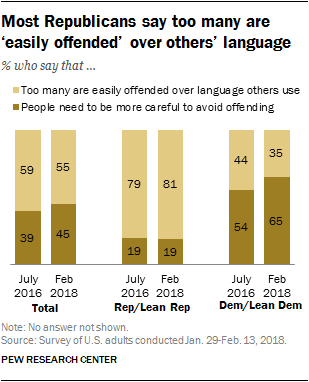 Overall, 55% of Americans currently say that “too many people are easily offended these days over the language that others use,” while 45% say that “people need to be more careful about the language they use to avoid offending people with different backgrounds.”
Overall, 55% of Americans currently say that “too many people are easily offended these days over the language that others use,” while 45% say that “people need to be more careful about the language they use to avoid offending people with different backgrounds.”
Since 2016, there has been a 6-percentage-point rise in the share who say people should be more careful with language (from 39% to 45%). At that time, the balance of public opinion was more clearly tilted to the view that people are too easily offended (59% said this, while 39% said people should be more careful about language).
While roughly eight-in-ten Republicans and Republican-leaning independents (81%) take the position that people are too easily offended by the language others use, about two-thirds of Democrats and Democratic leaners (65%) take the opposing view that people need to be more careful with language to avoid offenses.
Although this partisan divide is not new, it has widened since 2016. Republican attitudes are virtually unchanged over the past two years. But the share of Democrats now holding the view that people need to be more careful with language has increased 11 percentage points (up from 54% two years ago).
While the view that people should be more careful is held by majorities of Democrats in all ideological groups, it is particularly prevalent among liberals. Today, 72% of liberal Democrats and Democratic leaners take this position, compared with 59% of conservatives and moderates in the party. There are no significant differences in the views of Republicans by ideology.
 As in 2016, there remain significant gaps in these opinions between men and women and between blacks and whites.
As in 2016, there remain significant gaps in these opinions between men and women and between blacks and whites.
While a 61% majority of men say that too many people are easily offended these days over the language others use, women’s views are split: 50% say people should be more careful, 49% say too many people are easily offended.
However, the gender gap is concentrated among Democrats. While 72% of Democratic women say people need to be more careful about language to avoid offending others, a more modest majority (57%) of Democratic men say this. There are no significant differences in these views between Republican men and women.
Black people remain significantly more likely than either whites or Hispanics to hold the view that people need to be more careful about language to avoid offending those with different backgrounds. Today, 77% of African Americans say this, compared with 38% of whites and 44% of Hispanics.
Wide majority rejects bending the rules in politics
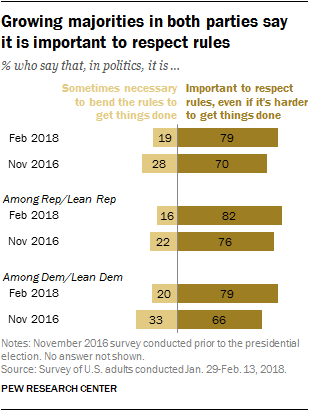 A majority of Americans (79%) say that in politics, “it is important to respect the rules, even if it makes it harder to get things done.” Just 19% say it is “sometimes necessary to bend the rules in order to get things done.”
A majority of Americans (79%) say that in politics, “it is important to respect the rules, even if it makes it harder to get things done.” Just 19% say it is “sometimes necessary to bend the rules in order to get things done.”
The share saying it is important to respect the rules has grown – among Republicans and Democrats alike – since just prior to the 2016 presidential election. While Republicans were somewhat more likely than Democrats to say this in November 2016, there is now no partisan gap in these views: 79% of Democrats and Democratic-leaning independents and 82% of Republicans and Republican leaners now say it’s important to respect political rules, even if it makes it harder to get things done.
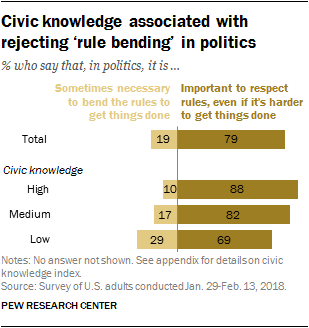 While there are no significant differences in these views across partisan or demographic groups, there are modest differences related to levels of civic knowledge.
While there are no significant differences in these views across partisan or demographic groups, there are modest differences related to levels of civic knowledge.
Nearly nine-in-ten Americans with high levels of civic knowledge (88%) say it’s important to respect the rules even if that makes it harder to get things done, while just 10% believe that it is sometimes necessary to bend the rules. Among those with relatively low levels of civic knowledge, a narrower – though still substantial – majority (69%) says respect for the rules is important, while about three-in-ten (29%) say that bending the rules is sometimes acceptable in order to get things done. These differences are evident even when controlling for partisanship.
Democratic views shift on making compromises in politics
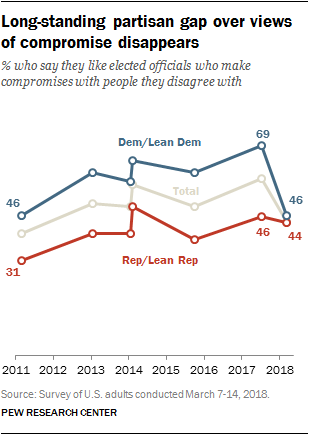 Roughly half of Americans say they prefer politicians who stick to their positions (53%), while slightly fewer say they like those who make compromises with people they disagree with (44%). This represents a substantial shift from July 2017, when 58% of the public said they preferred politicians who compromised compared with 39% who said they liked politicians who stick with their positions.
Roughly half of Americans say they prefer politicians who stick to their positions (53%), while slightly fewer say they like those who make compromises with people they disagree with (44%). This represents a substantial shift from July 2017, when 58% of the public said they preferred politicians who compromised compared with 39% who said they liked politicians who stick with their positions.
There is now no difference between Republicans and Democrats in their views of compromise. In six previous surveys conducted since 2011, Democrats were consistently more likely than Republicans to say they liked those who compromised. As recently as last July, 69% of Democrats said they preferred elected officials who made compromises; today just 46% say this. These views are little changed among Republicans and Republican leaners in recent years: Today, 44% say they like elected officials who make compromises, while 46% said this in July 2017.
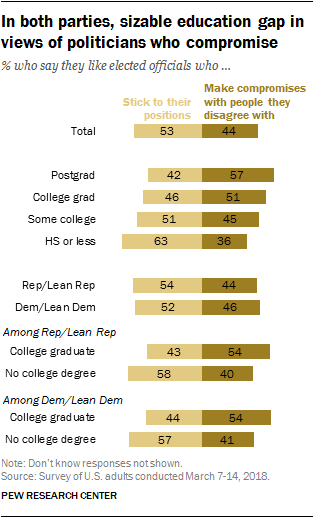 There are substantial educational differences in views of compromise in politics. A majority of those with postgraduate degrees say they like elected officials who make compromises with people they disagree with over those who stick to their positions (57% vs. 42%). Among those with bachelor’s degrees and those with some college experience, these views are roughly evenly divided. Among those with no college experience, most prefer politicians who stick to their positions: 63% say this, while just 36% say they prefer elected officials who make compromises with people they disagree with.
There are substantial educational differences in views of compromise in politics. A majority of those with postgraduate degrees say they like elected officials who make compromises with people they disagree with over those who stick to their positions (57% vs. 42%). Among those with bachelor’s degrees and those with some college experience, these views are roughly evenly divided. Among those with no college experience, most prefer politicians who stick to their positions: 63% say this, while just 36% say they prefer elected officials who make compromises with people they disagree with.
This pattern is seen in both parties, with slight majorities of college graduates saying they prefer politicians who make compromises (54% in both parties) and the balance of opinion reversed among those without college degrees (58% of Republicans and 57% of Democrats without bachelor’s degrees say they prefer elected officials who stick to their positions).